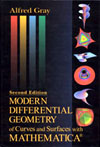|
References
|
|

|
For
animations
see . . .
John F. Putz, MAPLE
ANIMATION,
Chapman Hall CRC Press,
2003. |
For
those
who have
MATHEMATICA®, . . .
Alfred
Gray, Modern
Differential Geometry,
2nd ed., CRC
Press, 1998, pp.
304-305.
|

|
|
Howard
Eves,
An Introduction to
the History of Mathematics,
6th ed., Saunders College
Publishing, p. 324.
|
Victor
J.
Katz, A History of
Mathematics, 2nd ed.,
Addison Wesley Longman, 1998,
pp. 768-771.
|
Eric
W. Weisstein, CRC
Concise Encyclopedia of
Mathematics, CRC Press,
1999, pp. 1816-1819.
|
| Note:
Sections
of a torus that are taken as
planes parallel
to the axis (not skewed as in
the case of our animation) are
known as Spiric
Lines
of Perseus. |
|
|
|
